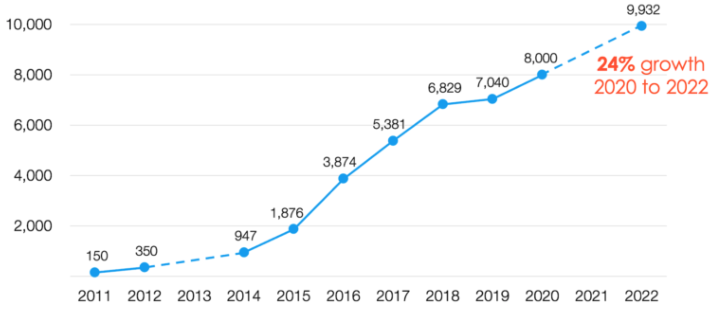Marketing operations is an essential aspect of any business that wants to achieve growth and success in today’s highly competitive business world. The B2B marketing landscape has undergone significant changes in recent years, with the advent of new technologies, digital channels, and changing customer preferences.

As a result, marketing operations in B2B markets have become more complex and challenging. These challenges can affect the effectiveness of marketing operations, making it difficult for companies to achieve their goals. In this blog post, I will explore the top 5 Challenges and Strategies for marketing operations in B2B markets. Some of these are familiar others highlight new opportunities to increase marketing contribution to pipeline.
Top 5 Challenges for Marketing Operations in B2B Markets
- Measuring ROI: One of the most significant challenges faced by marketing operations in B2B markets is measuring the return on investment (ROI) of marketing activities. According to a survey conducted by Hubspot, 40% of marketers struggle with proving the ROI of their marketing efforts. This is primarily because B2B sales cycles are longer and more complex, involving multiple touchpoints and decision-makers. As a result, measuring the impact of marketing activities on the final sale can be challenging.
- Data management: Another significant challenge faced by marketing operations in B2B markets is managing and utilizing data effectively. According to a study by Experian, 91% of companies believe that data is critical to their success. However, the same study found that only 55% of companies are using data effectively. In B2B markets, data is essential for identifying and understanding customer needs, creating personalized experiences, and making data-driven decisions. However, data management can be challenging due to the sheer volume of data, the need to maintain data accuracy and consistency, and the challenge of integrating data from multiple sources.
- Marketing technology: The increasing complexity of marketing operations in B2B markets has led to a proliferation of marketing technologies. According to a study by ChiefMartec, there are over 8,000 marketing technology solutions available in the market. While marketing technology can provide significant benefits, including automation, efficiency, and data analysis, managing and integrating multiple marketing technologies can be a challenge for marketing operations teams.
- Talent acquisition: According to a study by the Content Marketing Institute, 59% of B2B marketers struggle to find trained content marketing professionals. The same study found that the top skills lacking in the current marketing workforce are strategy development, content creation, and data analysis. As marketing operations become more complex, finding and retaining skilled marketing professionals who can manage data, technology, and strategy is becoming a significant challenge for B2B companies.
- Aligning sales and marketing: Finally, a significant challenge faced by marketing operations in B2B markets is aligning sales and marketing. According to a study by Marketo, companies with aligned sales and marketing teams achieve 208% more revenue from their marketing efforts. However, aligning sales and marketing can be challenging due to differences in goals, processes, and metrics. As a result, marketing operations teams need to work closely with sales teams to create a unified approach to customer acquisition and retention.

As we’ve seen marketing operations teams challenges are constantly evolving as are customer preferences channels for engagement and the different technology and automation options available. To remain competitive marketing opes teams need to be agile and adapt to stay ahead of the competition. By prioritizing the right strategies and tactics, companies can achieve greater success.
Top 5 Strategies to Accelerate Growth
- Creating a customer-centric approach
Creating a customer-centric approach should be the top priority for marketing operations in B2B markets. According to a survey conducted by Salesforce, 80% of customers say that the experience a company provides is as important as its products and services. This means that companies need to focus on understanding customer needs, preferences, and behaviors to create a personalized experience.
To achieve a customer-centric approach, marketing operations teams need to leverage data and technology to create a 360-degree view of the customer. This includes gathering data from multiple sources such as social media, customer surveys, and sales data to gain insights into customer behavior and preferences. By understanding the customer journey, marketing operations teams can create targeted campaigns, personalized messaging, and optimized customer experiences.
- Developing a content marketing strategy
The second priority for marketing operations in B2B markets is developing a content marketing strategy. According to a study by the Content Marketing Institute, 91% of B2B marketers use content marketing to reach customers, and 86% of B2B companies have a content marketing strategy.
A well-developed content marketing strategy includes creating relevant and informative content that addresses the needs and pain points of the target audience. This includes developing a content calendar, identifying content formats that resonate with the target audience, and creating a distribution strategy. By creating valuable content, marketing operations teams can position their company as a thought leader in the industry, build trust with customers, and drive engagement and conversions.
- Leveraging marketing automation
Marketing automation is a critical priority for marketing operations in B2B markets. According to a study by Marketo, 91% of successful B2B marketers use marketing automation to drive efficiency and ROI. Marketing automation involves using technology to automate repetitive marketing tasks such as email marketing, social media, and lead nurturing.
By automating marketing tasks, marketing operations teams can free up time to focus on strategy and analysis. Marketing automation also enables companies to deliver personalized messaging and experiences at scale, improving customer engagement and conversion rates.
- Utilizing data analytics
Utilizing data analytics is another critical priority for marketing operations in B2B markets. According to a survey by Forbes, 64% of marketing executives strongly agree that data-driven marketing is crucial to success in a hyper-competitive global economy. Data analytics involves collecting and analyzing data to gain insights into customer behavior, preferences, and buying patterns.
By leveraging data analytics, marketing operations teams can make data-driven decisions, optimize campaigns, and improve the customer experience. Data analytics also enables companies to measure the ROI of marketing campaigns and identify areas for improvement.
- Aligning sales and marketing
The final priority for marketing operations in B2B markets is aligning sales and marketing. According to a study by Marketo, companies with aligned sales and marketing teams achieve 208% more revenue from their marketing efforts. Alignment between sales and marketing involves creating a unified approach to customer acquisition and retention, with shared goals, processes, and metrics.
Marketing operations teams need to work closely with sales teams to create a customer journey that aligns with the sales process. This includes identifying target accounts, developing lead nurturing programs, and optimizing the handoff between marketing and sales. By aligning sales and marketing, companies can improve the customer experience, increase revenue, and reduce customer acquisition costs.
As we have seen marketing operations in B2B markets face numerous challenges, but by focusing on creating a customer-centric approach, developing a content marketing strategy, leveraging marketing automation, utilizing data analytics, and aligning sales and marketing, companies can position themselves for greater success.